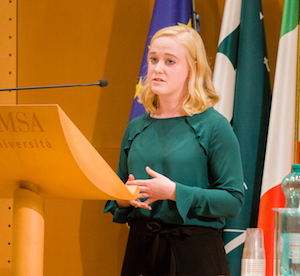Alyson Cox
A native of Indianapolis, Indiana, Alyson Cox is a first-year law student (J.D.) at Notre Dame Law School. Ms. Cox graduated from the University of Notre Dame with a bachelor's degree in biological sciences in 2017. During her time as an undergraduate, Ms. Cox served as president of “Notre Dame Right to Life”, the university’s largest student organization. Ms. Cox plans to pursue criminal law, with a particular focus on women's issues and human trafficking.

Good evening, everyone. My name is Aly Cox, I am from Indiana and I am currently studying at the University of Notre Dame Law School. I’m so grateful to share with you today how I have experienced Catholic Social Teaching to be one of the most beautiful parts of my faith-life.
I love being a member of the Catholic Church, but I struggle with doubts daily – I struggle when my family or friends are suffering, and I struggle intellectually with some of the more abstracts dogmas of our faith. In light of the recent revelations of abuse in the Church in the United States, I have had days where I struggled with the credibility of the Church.
On every day of doubt in my young adult life, Catholic Social Teaching is what has brought me back to Christ.
In Catholic Social Teaching, or what Saint Pope John Paul II called ‘Catholic Social Doctrine,’ — I have experienced the most intimate, compelling, and beautiful path to truly authentic human freedom and pursuing the common good.
For me, those principles of Catholic Social Teaching are 7 –
1. the life and dignity of the human person
2. the call to family, community, and participation
3. the gift of rights and the obligation of responsibilities
4. the preference we give to the poor
5. the dignity of work, no matter how ‘simple’
6. the call to solidarity and communion
7. and the care for all of God’s creation
To me, CST — in theory and in practice — is unique and compelling because of how it understands the infinite and irreplaceable value of the human person — that the person is both body and soul, that the person’s value is not defined by what it ‘produces’ but by the very fact that it is made in the image and likeness of God, that persons are fundamentally relational and that we flourish t ogether in communities — that we are at once infinitely valuable as individuals and we also become our best selves when we are in communion with others!
What a great gift can this can be to the life of the Church, and especially young people who are away from the Church!
Sadly, one of my frustrations as a young person is when these beautiful and coherent principles are subjected to the false dichotomies of modern, secular political life, especially in the Church in the United States. Often, the language of certain CST principles are co-opted for political gain, but the entirety of the theory of CST is ignored for its political inconvenience. The current state of the Church in the United States suggests exactly that - picking and choosing principles from the social doctrine of the Church compromises the entire pursuit — and an inability to practice what we preach compromises the authenticity of our witness to truth, goodness, and beauty.
Though I am only a young person, it is difficult for me to imagine that there has ever been a time in the Church in the United States where it was more obvious that power sought through reducible political gain rots the Church from the inside out and robs those people of faith from the communal effort of holiness that young persons of faith especially desire.
Certainly, the holiness of the Church and the grace of the Sacraments do not depend on the holiness of its members or its leaders; but the role of the Church on earth is to reflect and participate in the self-giving love of God! How difficult it is to see parts of the Church abuse the vulnerable through a kind of manipulative power that subverts and rips that fabric of Catholic Social Teaching apart!
I don’t experience Catholic Social Teaching to be easy. I don’t experience Catholic Social Teaching to be convenient. In fact, I experience it to go against the materialistic and relativist tendencies of much of contemporary culture. It is difficult — but its wholeness and enduring truth can be a light for the world, especially young people — just as it has been for me.
Catholic Social Teaching can heal the Church of politics and division, especially the kind of politics and division that has allowed for such abuse in our past. Catholic Social Teaching invites young people into a rich life of faith, helping us to understand why we are here, who we are called to be, and how we are called to relate to each other. These are some of the biggest questions that young people face each and every day.
I hope, at the beginning of this time the Church takes to think about young persons and the faith, that we all renew ourselves to an uncompromised life of faith that is authentically lived — and that the enduring ‘lights’ of the Church — such as its social doctrine, might be lived and communicated in the fullest!
Thank you.
